Analyzing the Impact of Inheritance within the Framework of Capitalism
VerifiedAdded on 2022/12/30
|9
|2673
|30
Essay
AI Summary
This essay delves into the complex relationship between inheritance and capitalism, exploring various economic perspectives and arguments. The author analyzes the viewpoints of Haslett, examining his ideals of capitalism, including distribution based on productivity, equal opportunity, and freedom. The essay critically assesses Haslett's arguments regarding inheritance, its impact on wealth distribution, and its potential effects on individual motivation and economic productivity. It also examines different theoretical viewpoints, including utilitarian, libertarian, and Rawlsian perspectives on inheritance and its role in society. The essay further discusses the U.S. tax system on wealth transfer, including estate, gift, and generation-skipping transfer taxes, and contrasts them with Haslett's proposal of abolishing inheritance. Overall, the essay provides a comprehensive analysis of the economic implications of inheritance within a capitalist framework.
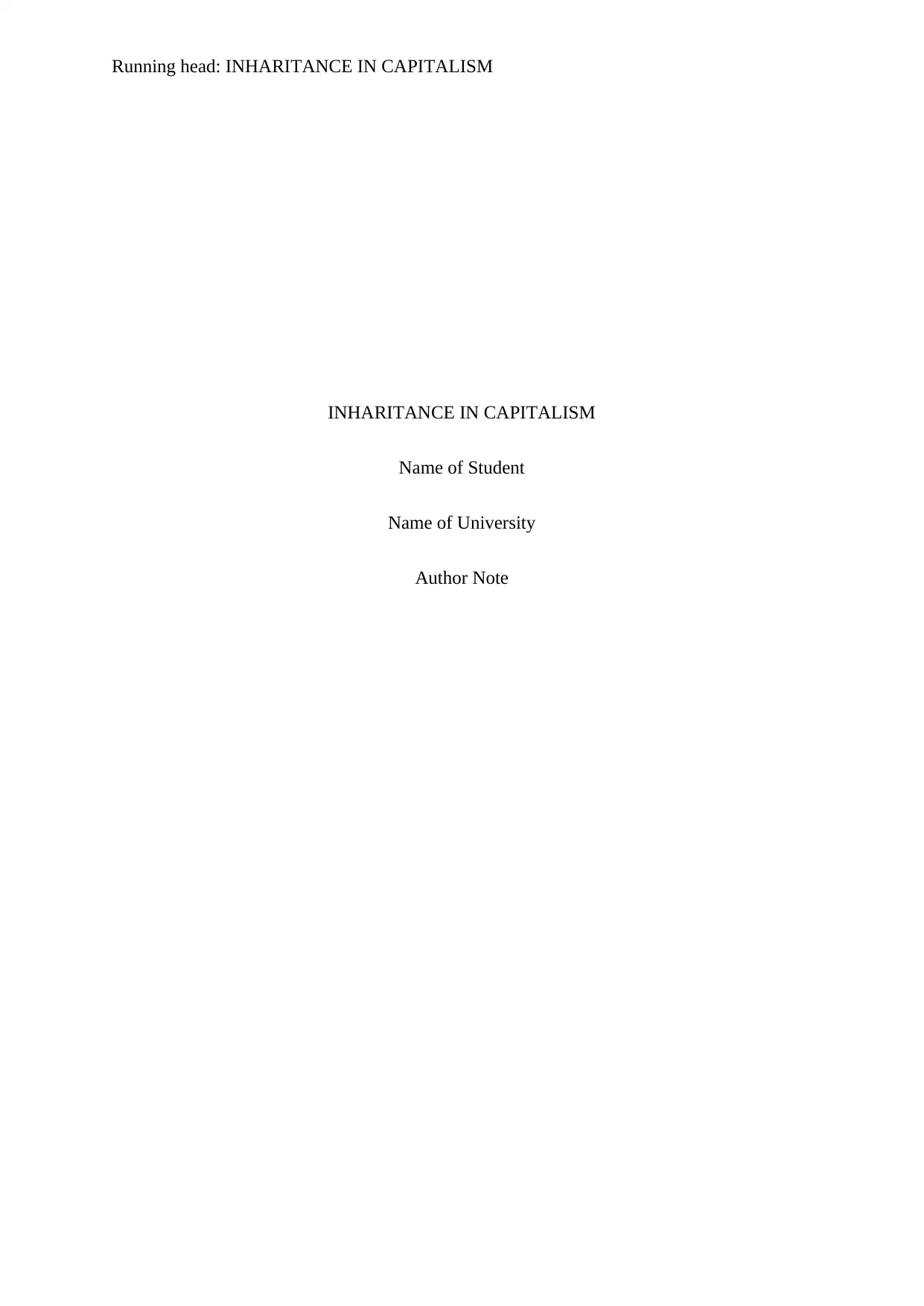
Running head: INHARITANCE IN CAPITALISM
INHARITANCE IN CAPITALISM
Name of Student
Name of University
Author Note
INHARITANCE IN CAPITALISM
Name of Student
Name of University
Author Note
Paraphrase This Document
Need a fresh take? Get an instant paraphrase of this document with our AI Paraphraser
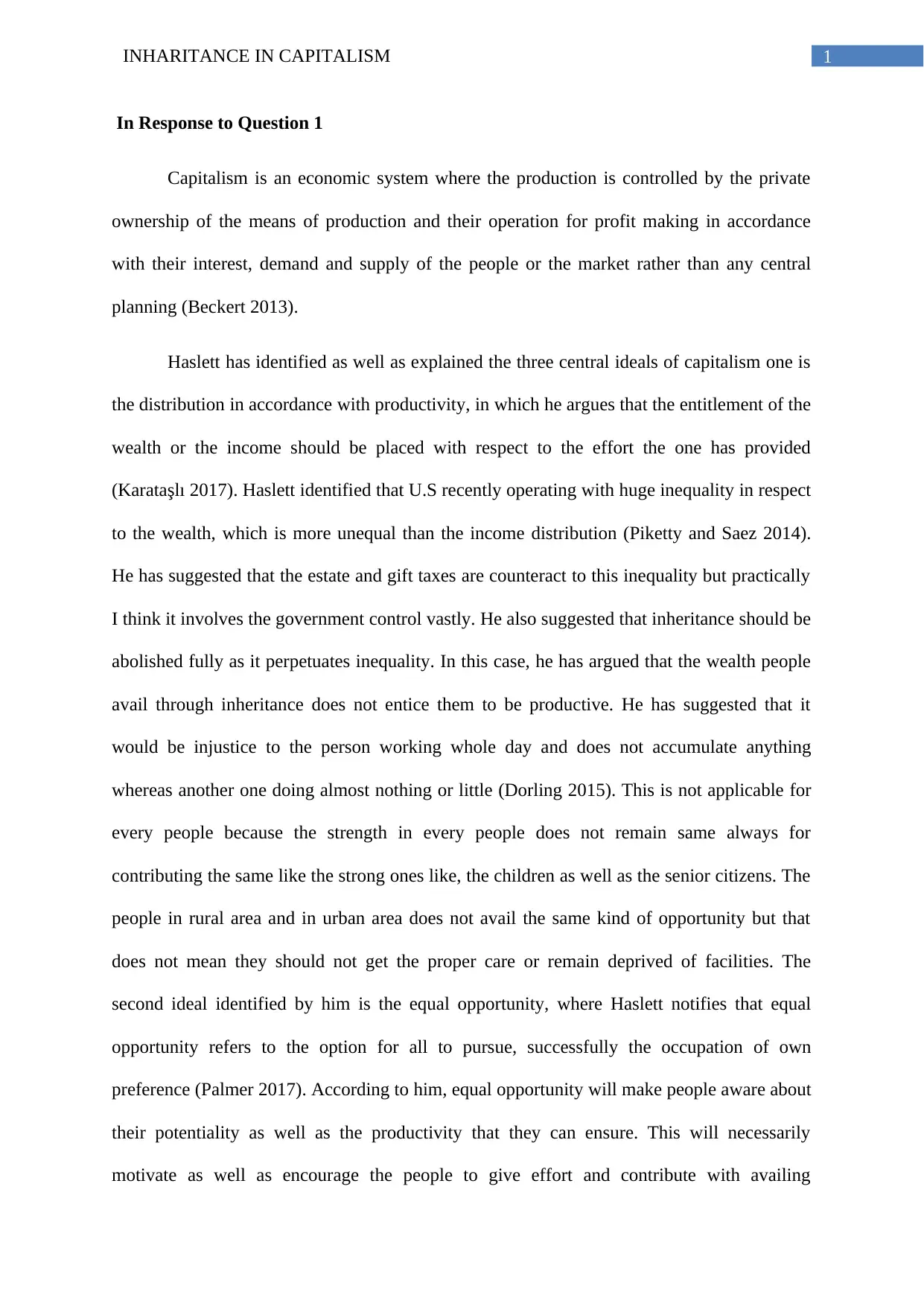
1INHARITANCE IN CAPITALISM
In Response to Question 1
Capitalism is an economic system where the production is controlled by the private
ownership of the means of production and their operation for profit making in accordance
with their interest, demand and supply of the people or the market rather than any central
planning (Beckert 2013).
Haslett has identified as well as explained the three central ideals of capitalism one is
the distribution in accordance with productivity, in which he argues that the entitlement of the
wealth or the income should be placed with respect to the effort the one has provided
(Karataşlı 2017). Haslett identified that U.S recently operating with huge inequality in respect
to the wealth, which is more unequal than the income distribution (Piketty and Saez 2014).
He has suggested that the estate and gift taxes are counteract to this inequality but practically
I think it involves the government control vastly. He also suggested that inheritance should be
abolished fully as it perpetuates inequality. In this case, he has argued that the wealth people
avail through inheritance does not entice them to be productive. He has suggested that it
would be injustice to the person working whole day and does not accumulate anything
whereas another one doing almost nothing or little (Dorling 2015). This is not applicable for
every people because the strength in every people does not remain same always for
contributing the same like the strong ones like, the children as well as the senior citizens. The
people in rural area and in urban area does not avail the same kind of opportunity but that
does not mean they should not get the proper care or remain deprived of facilities. The
second ideal identified by him is the equal opportunity, where Haslett notifies that equal
opportunity refers to the option for all to pursue, successfully the occupation of own
preference (Palmer 2017). According to him, equal opportunity will make people aware about
their potentiality as well as the productivity that they can ensure. This will necessarily
motivate as well as encourage the people to give effort and contribute with availing
In Response to Question 1
Capitalism is an economic system where the production is controlled by the private
ownership of the means of production and their operation for profit making in accordance
with their interest, demand and supply of the people or the market rather than any central
planning (Beckert 2013).
Haslett has identified as well as explained the three central ideals of capitalism one is
the distribution in accordance with productivity, in which he argues that the entitlement of the
wealth or the income should be placed with respect to the effort the one has provided
(Karataşlı 2017). Haslett identified that U.S recently operating with huge inequality in respect
to the wealth, which is more unequal than the income distribution (Piketty and Saez 2014).
He has suggested that the estate and gift taxes are counteract to this inequality but practically
I think it involves the government control vastly. He also suggested that inheritance should be
abolished fully as it perpetuates inequality. In this case, he has argued that the wealth people
avail through inheritance does not entice them to be productive. He has suggested that it
would be injustice to the person working whole day and does not accumulate anything
whereas another one doing almost nothing or little (Dorling 2015). This is not applicable for
every people because the strength in every people does not remain same always for
contributing the same like the strong ones like, the children as well as the senior citizens. The
people in rural area and in urban area does not avail the same kind of opportunity but that
does not mean they should not get the proper care or remain deprived of facilities. The
second ideal identified by him is the equal opportunity, where Haslett notifies that equal
opportunity refers to the option for all to pursue, successfully the occupation of own
preference (Palmer 2017). According to him, equal opportunity will make people aware about
their potentiality as well as the productivity that they can ensure. This will necessarily
motivate as well as encourage the people to give effort and contribute with availing
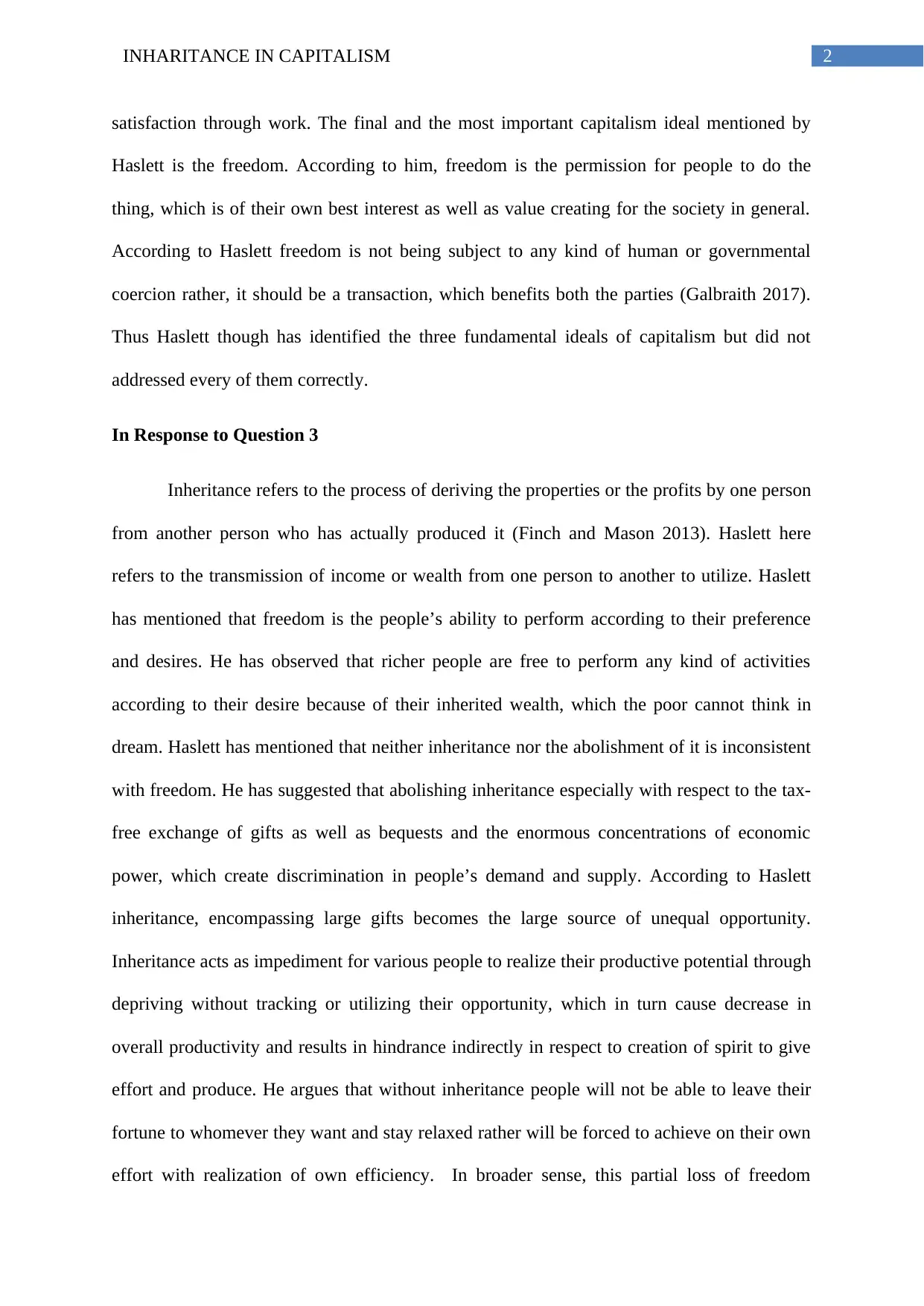
2INHARITANCE IN CAPITALISM
satisfaction through work. The final and the most important capitalism ideal mentioned by
Haslett is the freedom. According to him, freedom is the permission for people to do the
thing, which is of their own best interest as well as value creating for the society in general.
According to Haslett freedom is not being subject to any kind of human or governmental
coercion rather, it should be a transaction, which benefits both the parties (Galbraith 2017).
Thus Haslett though has identified the three fundamental ideals of capitalism but did not
addressed every of them correctly.
In Response to Question 3
Inheritance refers to the process of deriving the properties or the profits by one person
from another person who has actually produced it (Finch and Mason 2013). Haslett here
refers to the transmission of income or wealth from one person to another to utilize. Haslett
has mentioned that freedom is the people’s ability to perform according to their preference
and desires. He has observed that richer people are free to perform any kind of activities
according to their desire because of their inherited wealth, which the poor cannot think in
dream. Haslett has mentioned that neither inheritance nor the abolishment of it is inconsistent
with freedom. He has suggested that abolishing inheritance especially with respect to the tax-
free exchange of gifts as well as bequests and the enormous concentrations of economic
power, which create discrimination in people’s demand and supply. According to Haslett
inheritance, encompassing large gifts becomes the large source of unequal opportunity.
Inheritance acts as impediment for various people to realize their productive potential through
depriving without tracking or utilizing their opportunity, which in turn cause decrease in
overall productivity and results in hindrance indirectly in respect to creation of spirit to give
effort and produce. He argues that without inheritance people will not be able to leave their
fortune to whomever they want and stay relaxed rather will be forced to achieve on their own
effort with realization of own efficiency. In broader sense, this partial loss of freedom
satisfaction through work. The final and the most important capitalism ideal mentioned by
Haslett is the freedom. According to him, freedom is the permission for people to do the
thing, which is of their own best interest as well as value creating for the society in general.
According to Haslett freedom is not being subject to any kind of human or governmental
coercion rather, it should be a transaction, which benefits both the parties (Galbraith 2017).
Thus Haslett though has identified the three fundamental ideals of capitalism but did not
addressed every of them correctly.
In Response to Question 3
Inheritance refers to the process of deriving the properties or the profits by one person
from another person who has actually produced it (Finch and Mason 2013). Haslett here
refers to the transmission of income or wealth from one person to another to utilize. Haslett
has mentioned that freedom is the people’s ability to perform according to their preference
and desires. He has observed that richer people are free to perform any kind of activities
according to their desire because of their inherited wealth, which the poor cannot think in
dream. Haslett has mentioned that neither inheritance nor the abolishment of it is inconsistent
with freedom. He has suggested that abolishing inheritance especially with respect to the tax-
free exchange of gifts as well as bequests and the enormous concentrations of economic
power, which create discrimination in people’s demand and supply. According to Haslett
inheritance, encompassing large gifts becomes the large source of unequal opportunity.
Inheritance acts as impediment for various people to realize their productive potential through
depriving without tracking or utilizing their opportunity, which in turn cause decrease in
overall productivity and results in hindrance indirectly in respect to creation of spirit to give
effort and produce. He argues that without inheritance people will not be able to leave their
fortune to whomever they want and stay relaxed rather will be forced to achieve on their own
effort with realization of own efficiency. In broader sense, this partial loss of freedom
⊘ This is a preview!⊘
Do you want full access?
Subscribe today to unlock all pages.

Trusted by 1+ million students worldwide
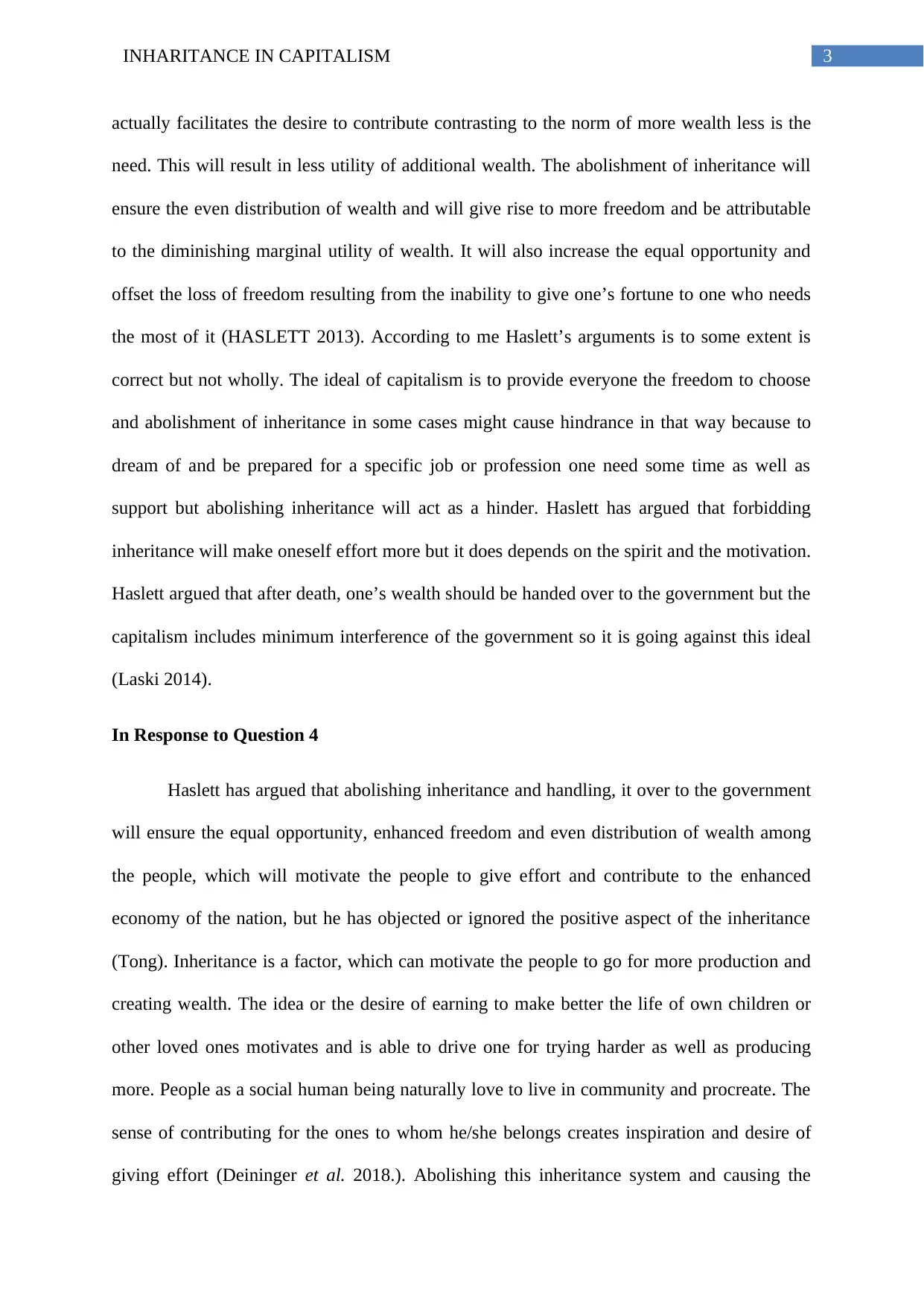
3INHARITANCE IN CAPITALISM
actually facilitates the desire to contribute contrasting to the norm of more wealth less is the
need. This will result in less utility of additional wealth. The abolishment of inheritance will
ensure the even distribution of wealth and will give rise to more freedom and be attributable
to the diminishing marginal utility of wealth. It will also increase the equal opportunity and
offset the loss of freedom resulting from the inability to give one’s fortune to one who needs
the most of it (HASLETT 2013). According to me Haslett’s arguments is to some extent is
correct but not wholly. The ideal of capitalism is to provide everyone the freedom to choose
and abolishment of inheritance in some cases might cause hindrance in that way because to
dream of and be prepared for a specific job or profession one need some time as well as
support but abolishing inheritance will act as a hinder. Haslett has argued that forbidding
inheritance will make oneself effort more but it does depends on the spirit and the motivation.
Haslett argued that after death, one’s wealth should be handed over to the government but the
capitalism includes minimum interference of the government so it is going against this ideal
(Laski 2014).
In Response to Question 4
Haslett has argued that abolishing inheritance and handling, it over to the government
will ensure the equal opportunity, enhanced freedom and even distribution of wealth among
the people, which will motivate the people to give effort and contribute to the enhanced
economy of the nation, but he has objected or ignored the positive aspect of the inheritance
(Tong). Inheritance is a factor, which can motivate the people to go for more production and
creating wealth. The idea or the desire of earning to make better the life of own children or
other loved ones motivates and is able to drive one for trying harder as well as producing
more. People as a social human being naturally love to live in community and procreate. The
sense of contributing for the ones to whom he/she belongs creates inspiration and desire of
giving effort (Deininger et al. 2018.). Abolishing this inheritance system and causing the
actually facilitates the desire to contribute contrasting to the norm of more wealth less is the
need. This will result in less utility of additional wealth. The abolishment of inheritance will
ensure the even distribution of wealth and will give rise to more freedom and be attributable
to the diminishing marginal utility of wealth. It will also increase the equal opportunity and
offset the loss of freedom resulting from the inability to give one’s fortune to one who needs
the most of it (HASLETT 2013). According to me Haslett’s arguments is to some extent is
correct but not wholly. The ideal of capitalism is to provide everyone the freedom to choose
and abolishment of inheritance in some cases might cause hindrance in that way because to
dream of and be prepared for a specific job or profession one need some time as well as
support but abolishing inheritance will act as a hinder. Haslett has argued that forbidding
inheritance will make oneself effort more but it does depends on the spirit and the motivation.
Haslett argued that after death, one’s wealth should be handed over to the government but the
capitalism includes minimum interference of the government so it is going against this ideal
(Laski 2014).
In Response to Question 4
Haslett has argued that abolishing inheritance and handling, it over to the government
will ensure the equal opportunity, enhanced freedom and even distribution of wealth among
the people, which will motivate the people to give effort and contribute to the enhanced
economy of the nation, but he has objected or ignored the positive aspect of the inheritance
(Tong). Inheritance is a factor, which can motivate the people to go for more production and
creating wealth. The idea or the desire of earning to make better the life of own children or
other loved ones motivates and is able to drive one for trying harder as well as producing
more. People as a social human being naturally love to live in community and procreate. The
sense of contributing for the ones to whom he/she belongs creates inspiration and desire of
giving effort (Deininger et al. 2018.). Abolishing this inheritance system and causing the
Paraphrase This Document
Need a fresh take? Get an instant paraphrase of this document with our AI Paraphraser
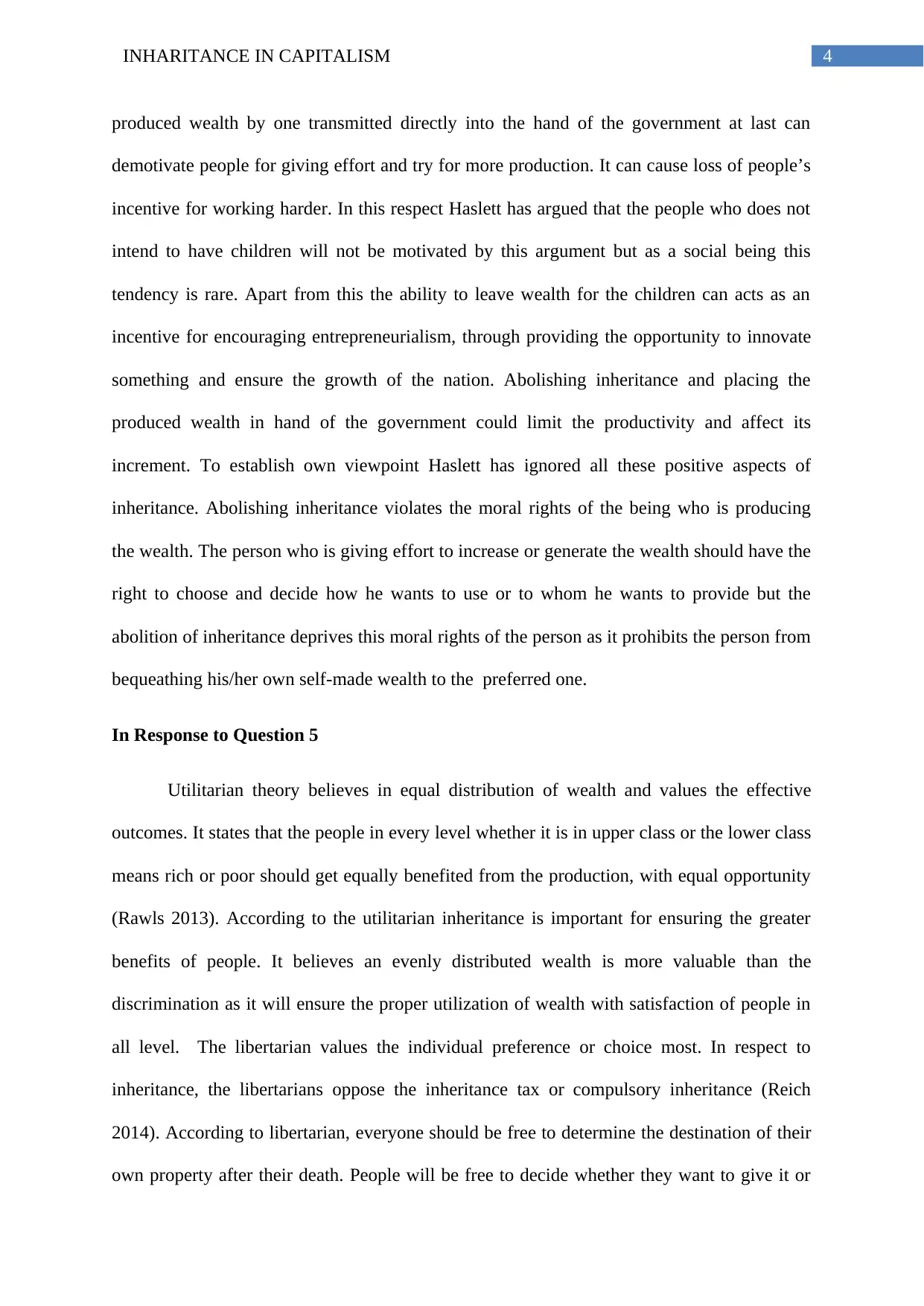
4INHARITANCE IN CAPITALISM
produced wealth by one transmitted directly into the hand of the government at last can
demotivate people for giving effort and try for more production. It can cause loss of people’s
incentive for working harder. In this respect Haslett has argued that the people who does not
intend to have children will not be motivated by this argument but as a social being this
tendency is rare. Apart from this the ability to leave wealth for the children can acts as an
incentive for encouraging entrepreneurialism, through providing the opportunity to innovate
something and ensure the growth of the nation. Abolishing inheritance and placing the
produced wealth in hand of the government could limit the productivity and affect its
increment. To establish own viewpoint Haslett has ignored all these positive aspects of
inheritance. Abolishing inheritance violates the moral rights of the being who is producing
the wealth. The person who is giving effort to increase or generate the wealth should have the
right to choose and decide how he wants to use or to whom he wants to provide but the
abolition of inheritance deprives this moral rights of the person as it prohibits the person from
bequeathing his/her own self-made wealth to the preferred one.
In Response to Question 5
Utilitarian theory believes in equal distribution of wealth and values the effective
outcomes. It states that the people in every level whether it is in upper class or the lower class
means rich or poor should get equally benefited from the production, with equal opportunity
(Rawls 2013). According to the utilitarian inheritance is important for ensuring the greater
benefits of people. It believes an evenly distributed wealth is more valuable than the
discrimination as it will ensure the proper utilization of wealth with satisfaction of people in
all level. The libertarian values the individual preference or choice most. In respect to
inheritance, the libertarians oppose the inheritance tax or compulsory inheritance (Reich
2014). According to libertarian, everyone should be free to determine the destination of their
own property after their death. People will be free to decide whether they want to give it or
produced wealth by one transmitted directly into the hand of the government at last can
demotivate people for giving effort and try for more production. It can cause loss of people’s
incentive for working harder. In this respect Haslett has argued that the people who does not
intend to have children will not be motivated by this argument but as a social being this
tendency is rare. Apart from this the ability to leave wealth for the children can acts as an
incentive for encouraging entrepreneurialism, through providing the opportunity to innovate
something and ensure the growth of the nation. Abolishing inheritance and placing the
produced wealth in hand of the government could limit the productivity and affect its
increment. To establish own viewpoint Haslett has ignored all these positive aspects of
inheritance. Abolishing inheritance violates the moral rights of the being who is producing
the wealth. The person who is giving effort to increase or generate the wealth should have the
right to choose and decide how he wants to use or to whom he wants to provide but the
abolition of inheritance deprives this moral rights of the person as it prohibits the person from
bequeathing his/her own self-made wealth to the preferred one.
In Response to Question 5
Utilitarian theory believes in equal distribution of wealth and values the effective
outcomes. It states that the people in every level whether it is in upper class or the lower class
means rich or poor should get equally benefited from the production, with equal opportunity
(Rawls 2013). According to the utilitarian inheritance is important for ensuring the greater
benefits of people. It believes an evenly distributed wealth is more valuable than the
discrimination as it will ensure the proper utilization of wealth with satisfaction of people in
all level. The libertarian values the individual preference or choice most. In respect to
inheritance, the libertarians oppose the inheritance tax or compulsory inheritance (Reich
2014). According to libertarian, everyone should be free to determine the destination of their
own property after their death. People will be free to decide whether they want to give it or
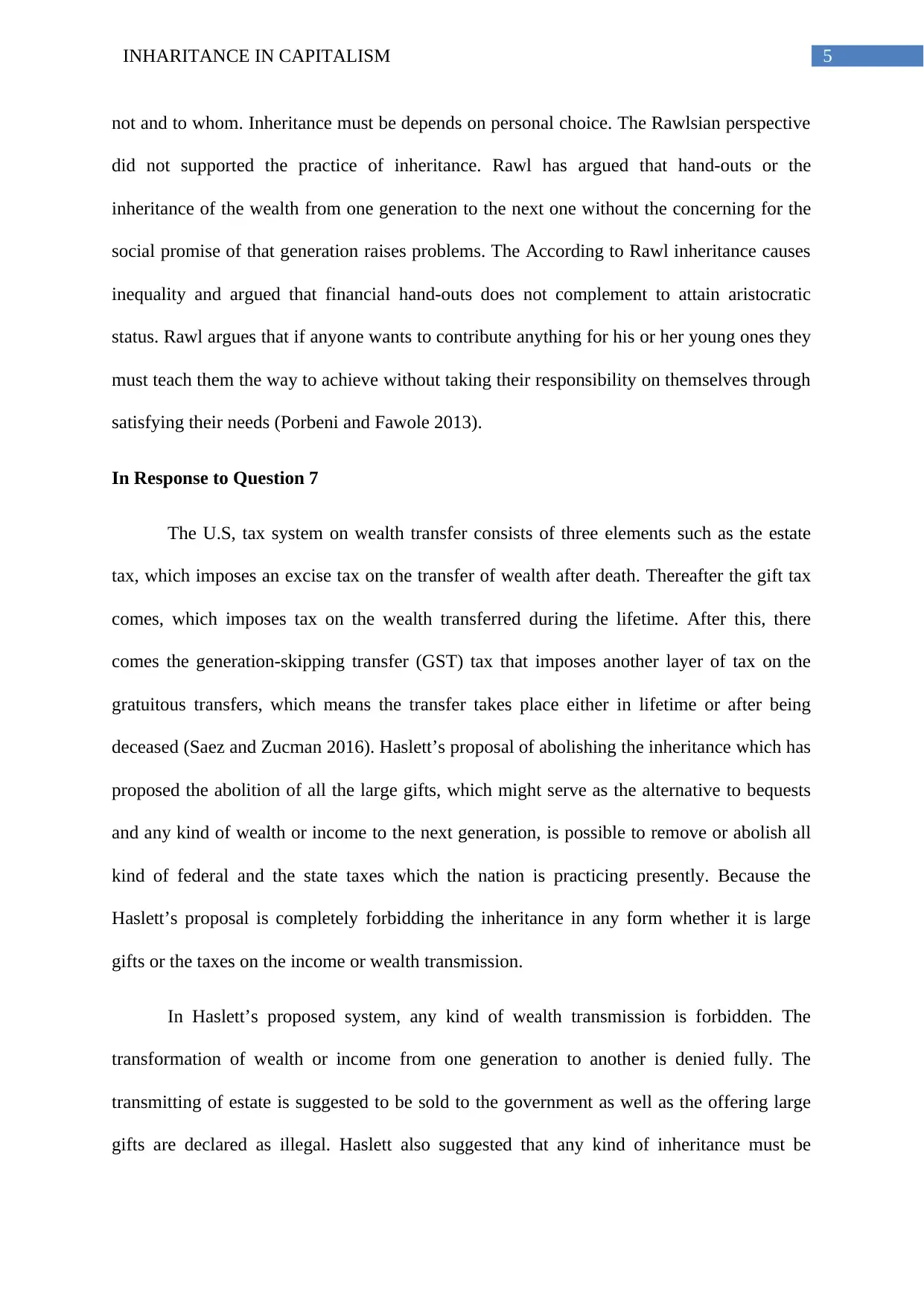
5INHARITANCE IN CAPITALISM
not and to whom. Inheritance must be depends on personal choice. The Rawlsian perspective
did not supported the practice of inheritance. Rawl has argued that hand-outs or the
inheritance of the wealth from one generation to the next one without the concerning for the
social promise of that generation raises problems. The According to Rawl inheritance causes
inequality and argued that financial hand-outs does not complement to attain aristocratic
status. Rawl argues that if anyone wants to contribute anything for his or her young ones they
must teach them the way to achieve without taking their responsibility on themselves through
satisfying their needs (Porbeni and Fawole 2013).
In Response to Question 7
The U.S, tax system on wealth transfer consists of three elements such as the estate
tax, which imposes an excise tax on the transfer of wealth after death. Thereafter the gift tax
comes, which imposes tax on the wealth transferred during the lifetime. After this, there
comes the generation-skipping transfer (GST) tax that imposes another layer of tax on the
gratuitous transfers, which means the transfer takes place either in lifetime or after being
deceased (Saez and Zucman 2016). Haslett’s proposal of abolishing the inheritance which has
proposed the abolition of all the large gifts, which might serve as the alternative to bequests
and any kind of wealth or income to the next generation, is possible to remove or abolish all
kind of federal and the state taxes which the nation is practicing presently. Because the
Haslett’s proposal is completely forbidding the inheritance in any form whether it is large
gifts or the taxes on the income or wealth transmission.
In Haslett’s proposed system, any kind of wealth transmission is forbidden. The
transformation of wealth or income from one generation to another is denied fully. The
transmitting of estate is suggested to be sold to the government as well as the offering large
gifts are declared as illegal. Haslett also suggested that any kind of inheritance must be
not and to whom. Inheritance must be depends on personal choice. The Rawlsian perspective
did not supported the practice of inheritance. Rawl has argued that hand-outs or the
inheritance of the wealth from one generation to the next one without the concerning for the
social promise of that generation raises problems. The According to Rawl inheritance causes
inequality and argued that financial hand-outs does not complement to attain aristocratic
status. Rawl argues that if anyone wants to contribute anything for his or her young ones they
must teach them the way to achieve without taking their responsibility on themselves through
satisfying their needs (Porbeni and Fawole 2013).
In Response to Question 7
The U.S, tax system on wealth transfer consists of three elements such as the estate
tax, which imposes an excise tax on the transfer of wealth after death. Thereafter the gift tax
comes, which imposes tax on the wealth transferred during the lifetime. After this, there
comes the generation-skipping transfer (GST) tax that imposes another layer of tax on the
gratuitous transfers, which means the transfer takes place either in lifetime or after being
deceased (Saez and Zucman 2016). Haslett’s proposal of abolishing the inheritance which has
proposed the abolition of all the large gifts, which might serve as the alternative to bequests
and any kind of wealth or income to the next generation, is possible to remove or abolish all
kind of federal and the state taxes which the nation is practicing presently. Because the
Haslett’s proposal is completely forbidding the inheritance in any form whether it is large
gifts or the taxes on the income or wealth transmission.
In Haslett’s proposed system, any kind of wealth transmission is forbidden. The
transformation of wealth or income from one generation to another is denied fully. The
transmitting of estate is suggested to be sold to the government as well as the offering large
gifts are declared as illegal. Haslett also suggested that any kind of inheritance must be
⊘ This is a preview!⊘
Do you want full access?
Subscribe today to unlock all pages.

Trusted by 1+ million students worldwide
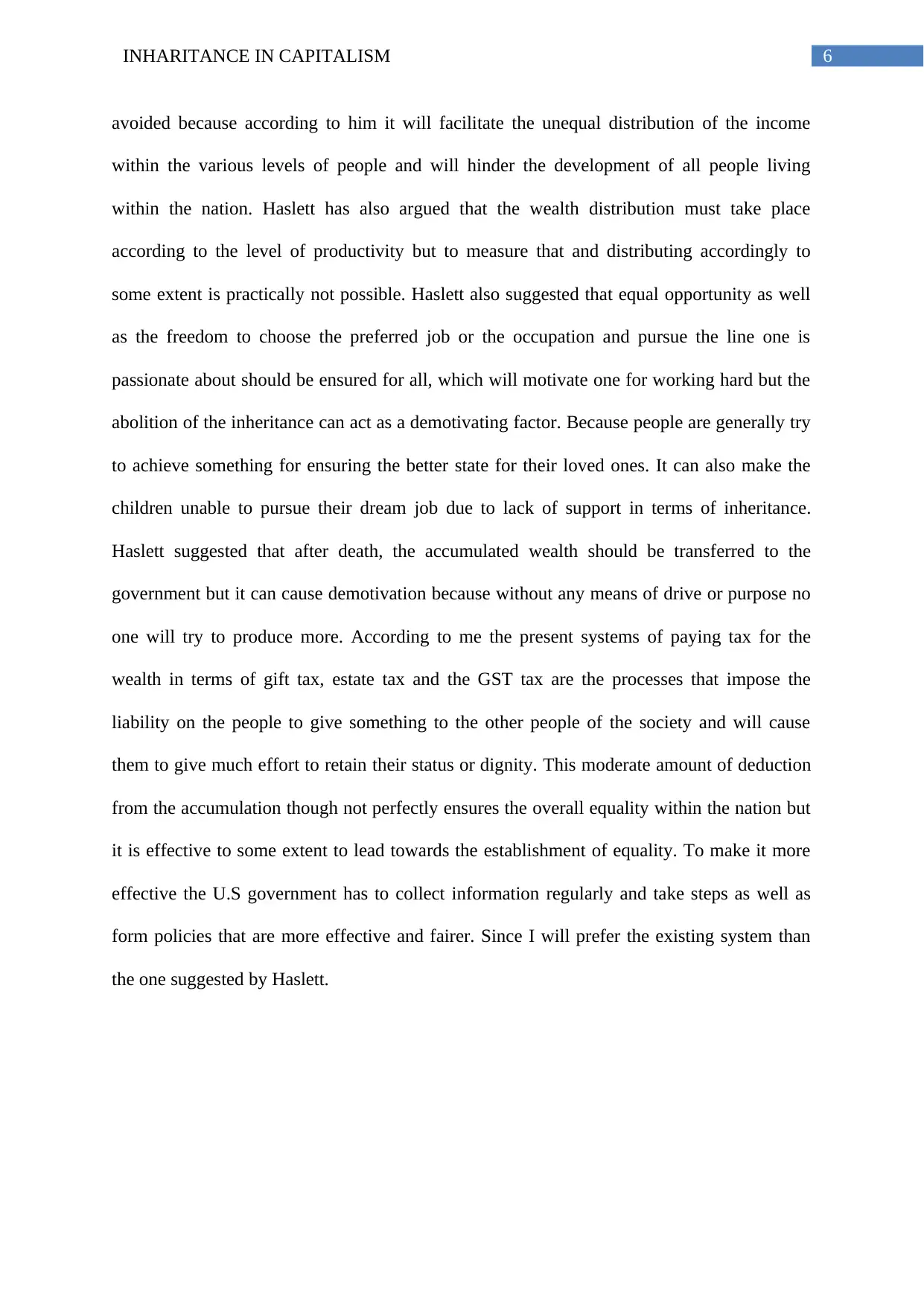
6INHARITANCE IN CAPITALISM
avoided because according to him it will facilitate the unequal distribution of the income
within the various levels of people and will hinder the development of all people living
within the nation. Haslett has also argued that the wealth distribution must take place
according to the level of productivity but to measure that and distributing accordingly to
some extent is practically not possible. Haslett also suggested that equal opportunity as well
as the freedom to choose the preferred job or the occupation and pursue the line one is
passionate about should be ensured for all, which will motivate one for working hard but the
abolition of the inheritance can act as a demotivating factor. Because people are generally try
to achieve something for ensuring the better state for their loved ones. It can also make the
children unable to pursue their dream job due to lack of support in terms of inheritance.
Haslett suggested that after death, the accumulated wealth should be transferred to the
government but it can cause demotivation because without any means of drive or purpose no
one will try to produce more. According to me the present systems of paying tax for the
wealth in terms of gift tax, estate tax and the GST tax are the processes that impose the
liability on the people to give something to the other people of the society and will cause
them to give much effort to retain their status or dignity. This moderate amount of deduction
from the accumulation though not perfectly ensures the overall equality within the nation but
it is effective to some extent to lead towards the establishment of equality. To make it more
effective the U.S government has to collect information regularly and take steps as well as
form policies that are more effective and fairer. Since I will prefer the existing system than
the one suggested by Haslett.
avoided because according to him it will facilitate the unequal distribution of the income
within the various levels of people and will hinder the development of all people living
within the nation. Haslett has also argued that the wealth distribution must take place
according to the level of productivity but to measure that and distributing accordingly to
some extent is practically not possible. Haslett also suggested that equal opportunity as well
as the freedom to choose the preferred job or the occupation and pursue the line one is
passionate about should be ensured for all, which will motivate one for working hard but the
abolition of the inheritance can act as a demotivating factor. Because people are generally try
to achieve something for ensuring the better state for their loved ones. It can also make the
children unable to pursue their dream job due to lack of support in terms of inheritance.
Haslett suggested that after death, the accumulated wealth should be transferred to the
government but it can cause demotivation because without any means of drive or purpose no
one will try to produce more. According to me the present systems of paying tax for the
wealth in terms of gift tax, estate tax and the GST tax are the processes that impose the
liability on the people to give something to the other people of the society and will cause
them to give much effort to retain their status or dignity. This moderate amount of deduction
from the accumulation though not perfectly ensures the overall equality within the nation but
it is effective to some extent to lead towards the establishment of equality. To make it more
effective the U.S government has to collect information regularly and take steps as well as
form policies that are more effective and fairer. Since I will prefer the existing system than
the one suggested by Haslett.
Paraphrase This Document
Need a fresh take? Get an instant paraphrase of this document with our AI Paraphraser
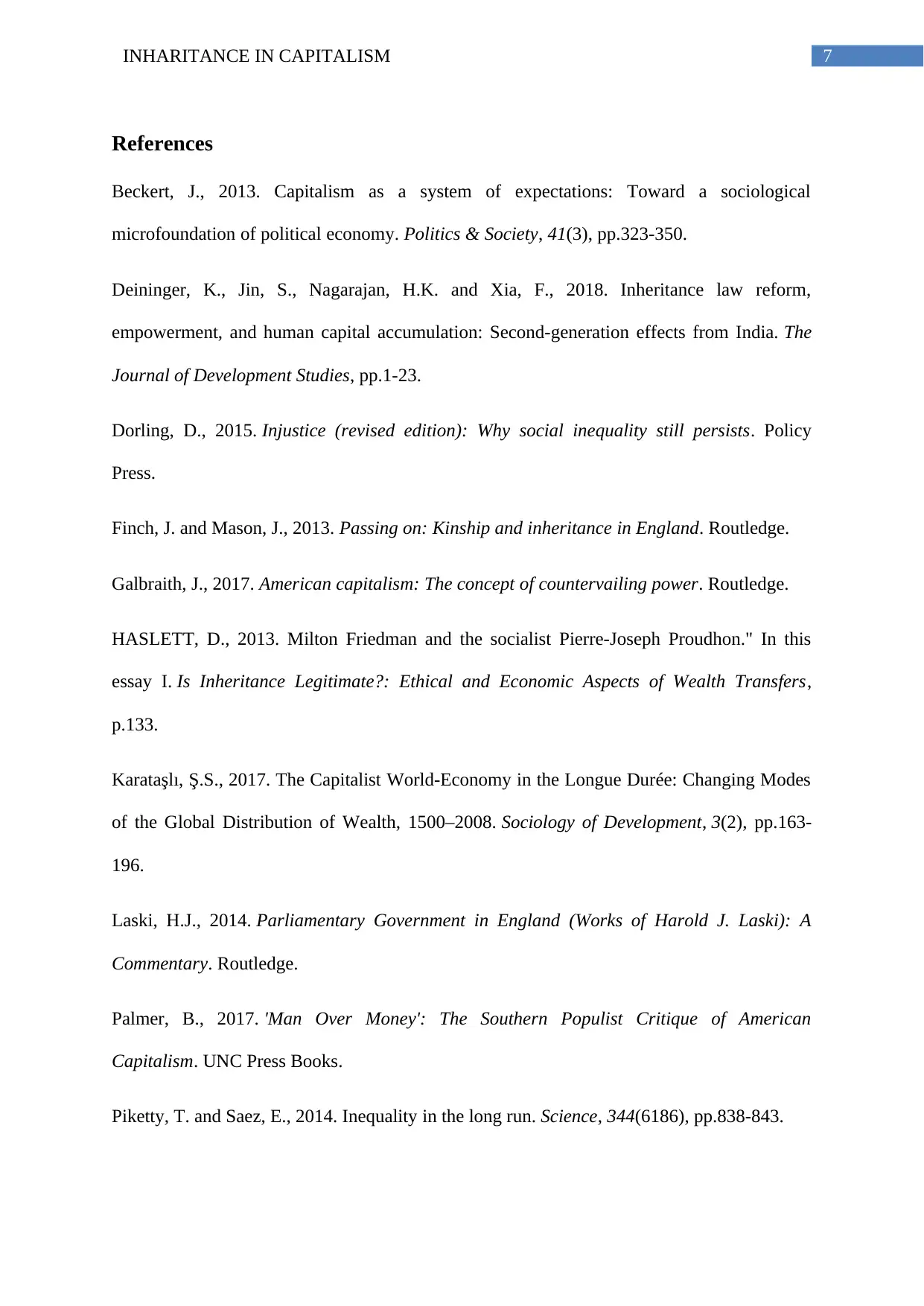
7INHARITANCE IN CAPITALISM
References
Beckert, J., 2013. Capitalism as a system of expectations: Toward a sociological
microfoundation of political economy. Politics & Society, 41(3), pp.323-350.
Deininger, K., Jin, S., Nagarajan, H.K. and Xia, F., 2018. Inheritance law reform,
empowerment, and human capital accumulation: Second-generation effects from India. The
Journal of Development Studies, pp.1-23.
Dorling, D., 2015. Injustice (revised edition): Why social inequality still persists. Policy
Press.
Finch, J. and Mason, J., 2013. Passing on: Kinship and inheritance in England. Routledge.
Galbraith, J., 2017. American capitalism: The concept of countervailing power. Routledge.
HASLETT, D., 2013. Milton Friedman and the socialist Pierre-Joseph Proudhon." In this
essay I. Is Inheritance Legitimate?: Ethical and Economic Aspects of Wealth Transfers,
p.133.
Karataşlı, Ş.S., 2017. The Capitalist World-Economy in the Longue Durée: Changing Modes
of the Global Distribution of Wealth, 1500–2008. Sociology of Development, 3(2), pp.163-
196.
Laski, H.J., 2014. Parliamentary Government in England (Works of Harold J. Laski): A
Commentary. Routledge.
Palmer, B., 2017. 'Man Over Money': The Southern Populist Critique of American
Capitalism. UNC Press Books.
Piketty, T. and Saez, E., 2014. Inequality in the long run. Science, 344(6186), pp.838-843.
References
Beckert, J., 2013. Capitalism as a system of expectations: Toward a sociological
microfoundation of political economy. Politics & Society, 41(3), pp.323-350.
Deininger, K., Jin, S., Nagarajan, H.K. and Xia, F., 2018. Inheritance law reform,
empowerment, and human capital accumulation: Second-generation effects from India. The
Journal of Development Studies, pp.1-23.
Dorling, D., 2015. Injustice (revised edition): Why social inequality still persists. Policy
Press.
Finch, J. and Mason, J., 2013. Passing on: Kinship and inheritance in England. Routledge.
Galbraith, J., 2017. American capitalism: The concept of countervailing power. Routledge.
HASLETT, D., 2013. Milton Friedman and the socialist Pierre-Joseph Proudhon." In this
essay I. Is Inheritance Legitimate?: Ethical and Economic Aspects of Wealth Transfers,
p.133.
Karataşlı, Ş.S., 2017. The Capitalist World-Economy in the Longue Durée: Changing Modes
of the Global Distribution of Wealth, 1500–2008. Sociology of Development, 3(2), pp.163-
196.
Laski, H.J., 2014. Parliamentary Government in England (Works of Harold J. Laski): A
Commentary. Routledge.
Palmer, B., 2017. 'Man Over Money': The Southern Populist Critique of American
Capitalism. UNC Press Books.
Piketty, T. and Saez, E., 2014. Inequality in the long run. Science, 344(6186), pp.838-843.
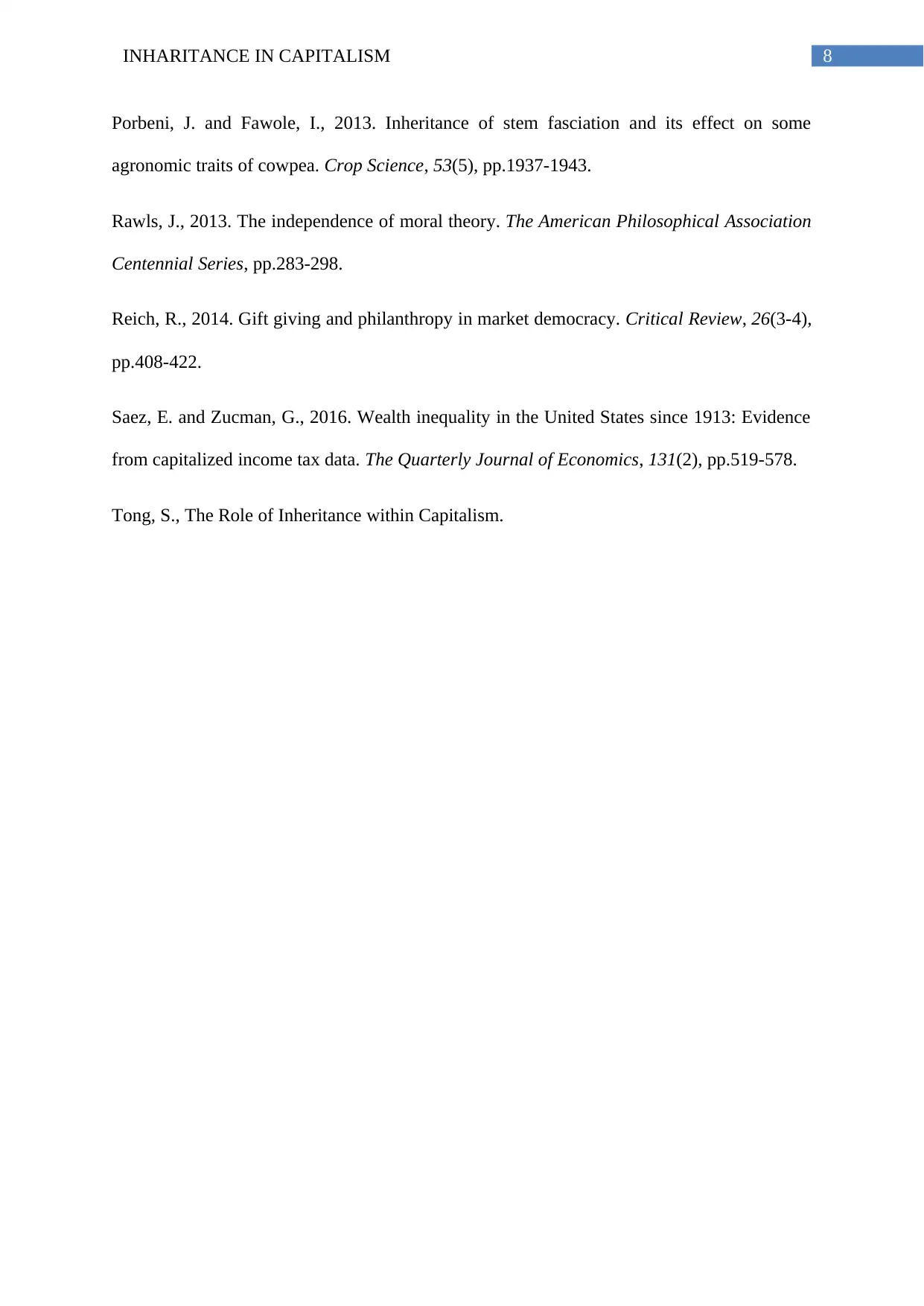
8INHARITANCE IN CAPITALISM
Porbeni, J. and Fawole, I., 2013. Inheritance of stem fasciation and its effect on some
agronomic traits of cowpea. Crop Science, 53(5), pp.1937-1943.
Rawls, J., 2013. The independence of moral theory. The American Philosophical Association
Centennial Series, pp.283-298.
Reich, R., 2014. Gift giving and philanthropy in market democracy. Critical Review, 26(3-4),
pp.408-422.
Saez, E. and Zucman, G., 2016. Wealth inequality in the United States since 1913: Evidence
from capitalized income tax data. The Quarterly Journal of Economics, 131(2), pp.519-578.
Tong, S., The Role of Inheritance within Capitalism.
Porbeni, J. and Fawole, I., 2013. Inheritance of stem fasciation and its effect on some
agronomic traits of cowpea. Crop Science, 53(5), pp.1937-1943.
Rawls, J., 2013. The independence of moral theory. The American Philosophical Association
Centennial Series, pp.283-298.
Reich, R., 2014. Gift giving and philanthropy in market democracy. Critical Review, 26(3-4),
pp.408-422.
Saez, E. and Zucman, G., 2016. Wealth inequality in the United States since 1913: Evidence
from capitalized income tax data. The Quarterly Journal of Economics, 131(2), pp.519-578.
Tong, S., The Role of Inheritance within Capitalism.
⊘ This is a preview!⊘
Do you want full access?
Subscribe today to unlock all pages.

Trusted by 1+ million students worldwide
1 out of 9
Related Documents
Your All-in-One AI-Powered Toolkit for Academic Success.
+13062052269
info@desklib.com
Available 24*7 on WhatsApp / Email
![[object Object]](/_next/static/media/star-bottom.7253800d.svg)
Unlock your academic potential
Copyright © 2020–2026 A2Z Services. All Rights Reserved. Developed and managed by ZUCOL.





